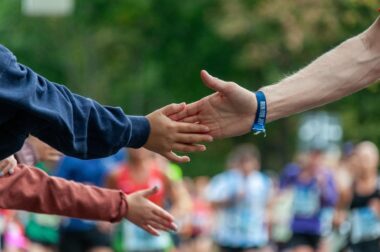The Impact of Group Challenges on Fitness Goals
In recent years, group challenges have emerged as potent tools in enhancing individual fitness goals. These collective efforts often provide the essential motivation needed to commit to and achieve personal fitness aspirations. Being part of a group not only fuels one’s commitment but also creates a platform for shared experiences, leading to increased social interaction among participants. Furthermore, the social nature of these challenges fosters accountability, encouraging individuals to stay on track. Participants tend to push their limits further when surrounded by supportive peers, enhancing their workout experiences tremendously. The sense of camaraderie often reduces the feelings of isolation that can sometimes accompany fitness journeys. Additionally, diverse fitness challenges help cater to varying fitness levels, ensuring that everyone can participate. Each participant benefits from collective motivation and energy. Hence, group challenges pave the way for personal growth, improved resilience, and commitment towards one’s fitness objectives. Individuals leave these challenges not only more fit but also with social ties that go beyond the fitness realm, promoting long-lasting friendships and support systems that continue to uplift and motivate.
Group challenges can enhance motivation significantly by introducing a competitive element. Participants often feel driven to outperform others within their groups, which can lead to impressive personal gains. This competitive spirit, however, should encourage healthy practices rather than fostering potential negativity. Ensuring the environment remains supportive is crucial. In a well-facilitated group challenge, the environment can act as a motivational catalyst, pushing individuals to stretch beyond their self-imposed limits. Challenges can range from step counts to specific exercise completions within a set time frame. These structured goals can help individuals detect their progress more clearly, making them feel accomplished. Being able to measure success often leads to increased motivation. The reward of achieving specific milestones can be a powerful motivator for continuous effort. Moreover, social support individuals receive from peers can significantly impact their overall commitment to fitness, instilling a sense of belonging to the group, making the workout more enjoyable. Consequently, whether through casual meet-ups or organized events, inherent competitive aspects can certainly play a vital role in reaching fitness milestones while enjoying the journey alongside others.
Building Resilience Through Social Connections
In addition to motivation, group challenges help build resilience among individuals striving towards personal fitness. Engaging in physical activities as part of a team creates an environment where individuals can process challenges together, forming resilient bonds. These social connections allow individuals to share not just fitness tips but also offer emotional support during tough moments. Such support can be instrumental in overcoming setbacks, whether due to missed workouts or failed goals. Participants within these groups often find accountability partners, who help them stay on track and foster a sense of responsibility. Learning to navigate challenges collectively serves to strengthen perseverance. Resilience, cultivated through shared experiences, significantly impacts an individual’s approach to future challenges in fitness and beyond. When setbacks occur, knowing that others have faced similar challenges can provide encouragement and strategies. This network of support establishes a robust safety net for emotional well-being that motivates individuals to keep going when things become tough. Moreover, individuals equipped with resilience are better prepared to tackle life challenges outside the gym, improving overall well-being and personal growth.
Group challenges foster not only individual fitness growth but also provide invaluable lessons about teamwork, collaboration, and mutual support. Engaging in these challenges allows participants to experience the power of collective effort, understanding that success can be achieved through contributions from all members. When groups work towards a common fitness goal, each member brings unique strengths, creating an enriched environment for shared learning. Members witness diverse strategies for overcoming challenges, allowing them to adopt new techniques to enhance their personal fitness journeys. Moreover, these experiences can develop leadership skills as individuals take turns in guiding peers or helping organize sessions. Throughout this journey, participants recognize the impact of encouragement—celebrating each other’s victories fosters a sense of unity and shared achievement. The collaborative atmosphere propels motivation, ensuring everyone feels involved and connected to the group’s progress. The celebration of milestones reinforces the positive impact of social support, illustrating a healthier approach towards fitness. Building these relationships improves the overall experience, highlighting that fitness is not just a solitary endeavor. It transforms into an interconnected journey filled with mutual support, shared goals, and collective victories.
Long-Term Benefits of Group Fitness
The benefits of participating in group challenges extend beyond immediate goals. They often lay the foundation for long-term engagement in fitness. Individuals who thrive in social environments are more likely to maintain their exercise routines and commitment to a healthier lifestyle. The connections formed during these challenges often extend past the duration of the event. Strong social ties encourage regular meet-ups or workouts, providing ongoing motivation. Sharing accountability among peers can lead to consistent participation in physical activities. As relationships deepen, individuals exchange ideas on healthy eating, training tips, and wellness practices, contributing to a holistic approach to fitness. Furthermore, group challenges can tailor future fitness programs that maintain engagement. Participants take pride in their ability to inspire others, creating a ripple effect. Witnessing others achieve their fitness goals can motivate individuals to embark on new challenges, further fueling the desire for continuous improvement. Ultimately, the skills, resilience, and relationships built within group challenges create a supportive environment that lends a lasting impact on health and fitness journeys, inspiring dedication even during tougher times.
A crucial aspect of group challenges is their ability to encourage diversity in fitness activities. Participants come from varied backgrounds, experiences, and fitness levels, leading to a richer exchange of ideas and practices. This diversity provides an inclusive environment where everyone can contribute their strengths. This multifaceted approach enables group members to try new activities they may otherwise not explore alone, from yoga to circuit training, leading to well-rounded fitness routines. Engaging in various activities enhances physical capabilities and increases the fun factor, which is vital for long-term commitment. Moreover, the chance to experiment within a group nurtures an atmosphere of exploration and creativity. Members might discover new likes and dislikes when trying different exercise forms together, steering them toward better personal fitness choices. Ultimately, the blend of preferences within a group can lead to innovative workout plans that challenge participants while keeping them engaged and excited. The diversity of experiences shared can enrich the fitness journey tremendously, making it more enjoyable and sustainable, setting individuals up for success in their quest towards achieving and surpassing their fitness goals.
Conclusion: The Essence of Community in Fitness
In conclusion, group challenges exemplify the profound impact of communal support in achieving individual fitness goals. The interplay of motivation, accountability, resilience, teamwork, and diversity creates a robust framework that encourages healthier lifestyles. Engaging in challenges fosters connections among participants that go beyond the workout. Successfully navigating fitness journeys together cultivates longstanding friendships that reinforce commitment and accountability. The essence of community within fitness transcends mere companionship; it nurtures an environment where individuals can uplift and inspire one another. The vibrant support system built through shared experiences equips participants to face future challenges in fitness and life, enhancing overall well-being. Consequently, individuals leave these challenges more physically adept and mentally fortified, eager to continue their fitness journeys alongside their newfound community. Ultimately, the lessons learned through collective efforts become valuable assets as individuals strive to maintain their commitments long after the challenges have ended. Group challenges symbolize a movement toward healthier living, highlighting the importance of shared goals, resilience, and lifestyle changes. Embracing the power of community enhances individual motivation, creating a supportive atmosphere where everyone can thrive together.
Moreover, underlying the success of group fitness challenges is the understanding that wellness is holistic. Focusing solely on physical fitness neglects emotional and social health, aspects that play equally crucial roles. Group challenges promote an all-rounded approach by integrating exercise with communal engagements and mental well-being strategies. Participants learn to celebrate informal interactions, sharing recovery stories or wellness triumphs, fostering a culture of positivity. This creates spaces where individuals feel encouraged to express concerns regarding mental and emotional health, leading to collective improvement in these areas. Group settings can address stress and anxiety, often associated with fitness journeys. By creating environments where individuals share their wellness concerns, they can support their peers effectively, helping them navigate complex emotional landscapes together. This sharing creates avenues for professional support when necessary, encouraging individuals to seek help rather than isolate themselves. Recognizing the interconnectedness of physical and mental health strengthens relationships within these groups and promotes personal growth. The collaborative nature of group challenges fosters a sense of belonging and identity, transforming individual fitness journeys into richly layered experiences of growth, support, and community.





